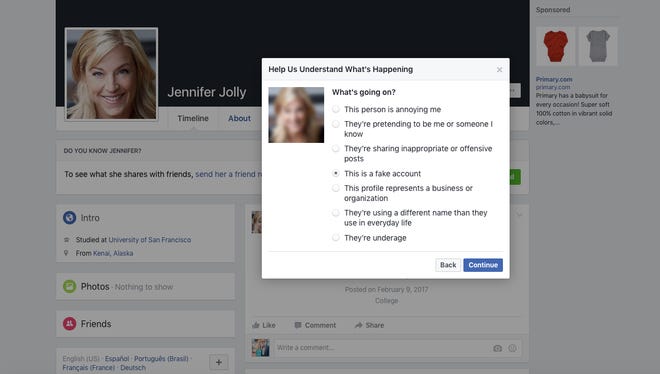When I Start Sending Friend Requests Facebook Upload a Photo of Yourself
A few weeks ago, I got a Facebook request from "myself." I recognized it right away as a common Facebook cloning scam.

The mode it works is simple. Cyber-crooks snag a photograph of you, usually right from your ain contour folio, poach whatsoever information yous've made public, then reach out to all your real friends and family. Once anyone you actually know accepts the fake Facebook friend request or engages with them on Messenger, the scammers typically make a play for money, personal info, or even endeavor to infect your calculator or phone with malware.
When the same matter happened to my mom last year, the scammer (pretending to be my female parent) hitting up my cousin with a sob story asking for money. He texted me instead and I told my cousin how to study it to Facebook.
A few hours later, another one of her friends received a message from the crook to "click this link to see a slap-up YouTube video you're in." She as well, smelled a skunk. Had she actually clicked the link, though, it could take infected her computer with malware or a virus, logged her passwords and given hackers the fast rails to her bank business relationship, email or store accounts.

Spotting the fakes
So how practice you lot know that a friend request is existent vs. imitation? Here are a few questions to help y'all figure that out.
Are they a indistinguishable? This is the nigh obvious test for any fake friend, and all you have to do is see if someone with the aforementioned name is already friends with you on Facebook. Nobody has any reason to make more than one account, so if your all-time friend from higher is notwithstanding on your friends listing simply only sent yous some other friend request, ship it straight into the trash. Then report information technology.
Check their photos. Okay, and then a hacker will probably notice a few freebie photos for their profile, only if you lot dig into their albums their plan totally falls apart. Earlier you lot have a shady friend request, click on their name and get to their contour folio. Browse through their photos and albums and see what's there. If it's bare, bated from the profile motion-picture show, or has just a couple random photos with no comments or likes, you've simply nabbed a faker.
Don't go a victim to a Facebook impostor
Frisk their friends listing. If someone is targeting yous, their fake account is likely but a shell with very lilliputian going on. Click on their friends list and see how many they have. If information technology's blank, run for the hills, only even if information technology'due south well populated, those could all exist fake or spam profiles as well, so exist certain to check what mutual friends you lot have in common. If the person isn't friends with any of your friends, it'southward almost certainly a scammer.

If you do spot a fake, block, report, and warn your friends. (Facebook also cracks downward pretty hard on these kind of shenanigans these days.) From the scammer'southward main Facebook profile folio, you can click the little "more" icon (three little dots in a row) adjacent to their profile film and then select "Report." A little menu pops up request you what you want to report, so select "Study this Profile." One time you do this, Facebook volition know to wait at the business relationship and take any actions needed. After you've reported, click that little "more" icon again and select "Block" to remove the account from your life forever.


Get out the links behind
Fifty-fifty if you're skillful about ditching fake friends and ignoring anonymous requests, anyone on Facebook can yet send a message to your "Other" inbox. In Facebook Messenger, these pop upwardly as "Message Requests," and even if someone isn't your friend, he or she tin still transport you nasty links and malware without much consequence.
Never ever click on any links yous become in these unverified messages, and do your best to avoid interaction with anyone who sends you a chat request out of the blueish, even if he or she looks similar someone you lot know. Follow the rules above and verify before yous even reply, and if you determine it's a simulated, caput to the scammer'due south profile page and block them.
Jennifer Jolly is an Emmy Award-winning consumer tech contributor and host of USA TODAY'due south digital video show TECH NOW. E-mail service her at techcomments@usatoday.com. Follow her on Twitter @JenniferJolly.
Source: https://www.usatoday.com/story/tech/columnist/2017/02/17/attack-of-the-facebook-fakes/97764610/
0 Response to "When I Start Sending Friend Requests Facebook Upload a Photo of Yourself"
إرسال تعليق